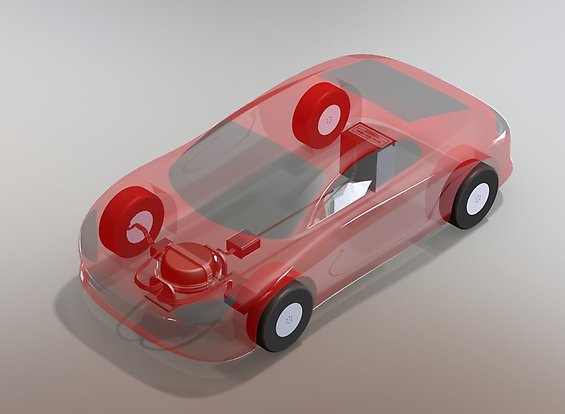Electromobility

All-electric vehicles like cars, trains, boats and aircraft, are increasing in popularity. The focus of our research lies on power electronics and electrical converters; control strategies for the electric driveline; charging infrastructure and kinetic energy storage (rotating mass) as a power storage.
At the Division of Electricity, we have conducted research in electric propulsion systems for a long time. Our research has a special focus on grid integration and charging infrastructure, but we also devote ourselves to system studies of entire drivelines and more specific research on, for example, material selection in electrical machines.
We have collaborations with several different companies and are involved in projects focused on electrification for different types of transportation. We are also involved in a collaborative project on electric airplanes: ELISE - Electric Aviation in Sweden.
Swedish Electromobility Centre
We are a part of the Swedish Electromobility Centre (SEC) and has several research projects and researchers active in the centre. The SEC is a national competence centre for electromobility and gathers expertise from both academia, industry and society. In particular, the department is active in Theme 5, Interaction between vehicles and electricity networks and one of the theme leaders for the theme comes from the department. If you want to know more about the SEC and its activities or if you have proposals for projects, you are welcome to contact Valeria Castellucci: valeria.castellucci@uu.se
One of the ongoing projects within SEC, Theme 5, including research at the Division of Electricity, is called "Data exchange between vehicle and power system for optimal charging" and concerns questions about what data/information that may be needed for different charging strategies of different types of electric vehicles, now and in the future. The project is expected to contribute with knowledge in, for example, future charging strategies, V2G and charging of autonomous electric vehicles. For questions about the project, please contact Jennifer Leijon: jennifer.leijon@angstrom.uu.se
Read more about Swedish Electromobility Centre (SEC) at their website
Charging infrastructure for electric aviation
We investigate how electric aircrafts can be charged in the future at Swedish airports. Other electric vehicles may also need to be charged there. The goal is to create an overview of how the airports can be developed to meet a future increased need of electricity.
Research project: Resource-efficient energy system solutions for airports with high share of electric aviation
How will the future electrified airplanes in Sweden be charged? Is there enough electricity at the airports today for electric aviation? These questions interest us in the project Resource-efficient energy system solutions for airports with high share of electric aviation. Within this project, we aim to investigate how the electrified airplanes of the future can be charged in a sustainable way at our airports and what the future electricity need may be there. Both national and international projects on charging of electric aircrafts will be analyzed. We are investigating the possibilities of charging planes with renewably generated electricity and the possibilities for energy storage with batteries at the airports. Electric vehicles other than electric planes may also need to be charged at the airports. In summary, the goal is to create a holistic perspective on the energy systems at the future airports. We take a closer look at electrification of the airports in Visby and Skellefteå, Sweden.
The project is funded by the Swedish Energy Agency and is a collaboration between Uppsala University, RISE, Swedavia och Skellefteå Airport.
For questions regarding the project, contact Karin Thomas: karin.thomas@uu.se
Research project: The impact of charging strategies on the electric car’s battery system
There is a rapid development towards more electric cars in society today. However, electric cars need to be charged continuously and many new charging strategies have been proposed. Fast charging, battery replacement, wireless charging, smart charging and vehicle-to-grid are all examples of how we may want to charge our electric cars in the coming years. One goal is that electric car charging should be as quick and smooth as refueling a traditional vehicle. Some may want to charge the electric car quickly with high power even in cold weather, or only charge the electric car when the electricity price is as low as possible to reduce the electricity bill.
But how is the electric car's battery affected by different ways of charging or discharging? The electric car's battery will age differently depending on how we choose to charge the electric cars. This in turn affects, for example, the value and the lifespan of the vehicle. The development of both battery technology and charging strategies is very fast in society, together with new business models for electric cars. Therefore, there is an interdisciplinary research field about the electric car's battery and the choice of charging strategy that can be studied more and continuously going forward.
The project “The impact of charging strategies on the electric car’s battery system”, which is funded by the Swedish Energy Agency during 2023, aims to study how different charging strategies of electric cars affect the electric car's battery and the car's durability. And the reverse: how batteries can be designed to meet our charging needs in the future. For questions about this project, please contact Jennifer Leijon: jennifer.leijon@angstrom.uu.se
